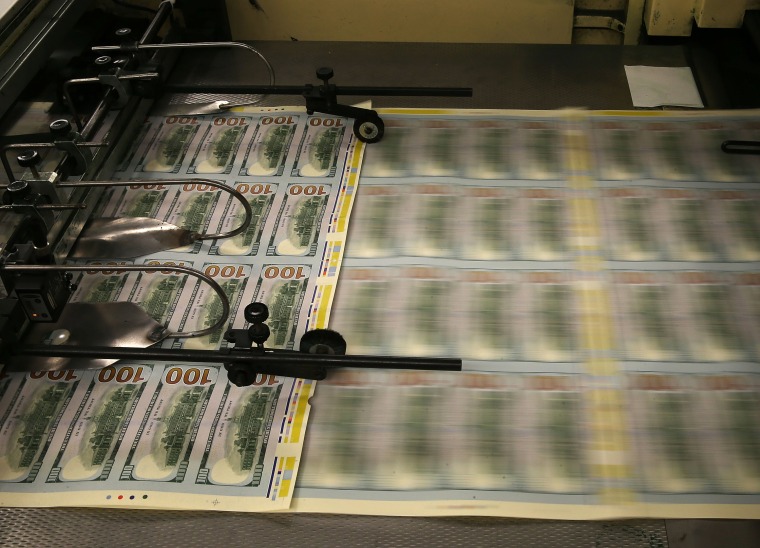When there's a global economic crisis, investors from around the world have spent the last several generations doing one thing: they buy U.S. treasuries. The reasoning, of course, is that there is no safer investment, anywhere on the planet, than the United States of America -- which has the strongest and largest economy on the planet, and which always pays its bills.
All of these assumptions, of course, were cultivated over generations, and pre-date the radicalization of the Republican Party.
But what happens when U.S. treasuries are no longer considered safe, Americans can no longer be counted on to pay its bills, and the nation's most powerful economy chooses to default on purpose? The world starts reevaluating old assumptions, that's what.
In Britain, Jon Cunliffe, who will become deputy governor of the Bank of England next month, told members of Parliament that banks should be developing contingency plans to deal with an American default if one happens.And Chinese leaders called on a "befuddled world to start considering building a de-Americanized world." In a commentary on Sunday, the state-run Chinese news agency Xinhua blamed "cyclical stagnation in Washington" for leaving the dollar-based assets of many nations in jeopardy. It said the "international community is highly agonized."
I know I've been pushing this thesis in recent weeks, but it's important to remember the unique role the United States plays in global leadership and the extent to which Republican antics in Congress will change the dynamic that's been stable for the better part of the last century.
No major western power has defaulted since Hitler's Germany, so this week may add some history to the potentially catastrophic economic consequences, and the world is watching closely.
Indeed, try to imagine explaining this ongoing crisis to a foreign observer who doesn't fully appreciate the nuances of domestic politics. "Yes, we have the largest economy on the planet. Yes, we want to maintain global credibility. Yes, the process of extending our borrowing authority is incredibly easy and could be completed in about 10 minutes. No, some members of our legislative branch have decided they no longer want the United States to honor its obligations and pay for the things they've already bought."
I suspect global observers would find this truly inexplicable. As it happens, I'd agree with them.
Ezra Klein added yesterday that to the rest of the world, "the United States looks insane right now."
They're dealing with real problems that their political systems are struggling to solve. The United States' political system is creating fake problems that it may choose to leave unsolved."The United States was the one bright spot in the world recovery," says OECD Secretary General Angel Gurria. "It was leading the recovery! Leading the creation of jobs! This unfortunate situation with the budget and debt happens at the moment it was looking good." [...]At best, the United States is slowing its recovery -- and that of the rest of the world. At worst, it's going to trigger another global crisis. That's why, Gurria says, his concern isn't that the United States' economy is weak, but that its political system is.
It's heartbreaking that so much of the world is now laughing at us, not because we have crises we can't solve, but because members of one party -- the one that lost the most recent national elections -- insist on manufacturing new crises to advance their unpopular agenda.
To reiterate what we discussed last week, there's a global competition underway for power and influence in the 21st century. Americans have rivals who are playing for keeps. We can either be at the top of our game or we can watch others catch up.
And it's against this backdrop that House Speaker John Boehner and his Republican colleagues shut down the government, threaten default, fight tooth and nail to strip Americans of their health care benefits, and keep spending levels so low we're kicking children out of Head Start centers while our global competitors invest heavily in education.
It's as if some have a vision in which we no longer lead and we aim for second place on purpose.
Great nations can't function the way we're struggling to function now. The United States can either be a 21st-century superpower or it can tolerate Republicans abandoning the governing process and subjecting Americans to a series of self-imposed extortion crises.
It cannot do both.
China is talking about "a de-Americanized world." It's time for Republicans to decide whether they intend to help them.
